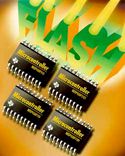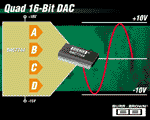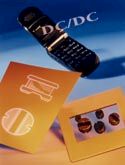
|
| Lowest-Power
Flash MCUs From Texas Instruments Available for Only 99 Cents |
| Device Speeds
Time to Market for Battery Powered Products |
 |
DALLAS (Nov.
29, 1999) - Based on the industry's lowest power
embedded flash memory technology, Texas Instruments
introduced four new microcontrollers (MCUs), broadening
its |
|
MSP430
product line. The new devices allow portable/battery powered
end equipment manufacturers more flexibility by permitting
upgrades in the field and enabling more robust code
development, last minute code fixes, increased testability,
lower manufacturing costs, reduced time to market, and
non-volatile data capture.
See http://www.ti.com/sc/msds2132u
Two of the new devices are extensions of TI's MSP430C112x line
of 16-bit RISC (reduced instruction set computing) MCUs. These
flash devices, designated MSP430F112 and MSP430F1121, feature
four kilobytes (4KB) of flash memory, an operating voltage
range of 1.8V to 3.6V and 2.2V to 3.6V respectively, and up to
8 MIPs performance. The MSP430F1121 also includes a comparator
module, which enables low cost, high-precision
analog-to-digital conversion (ADC).
The other two devices, the MSP430F110 and MSP430F1101, offer a
new, low cost product line in flash-only versions, providing
the same functionality as the MSP430F112 and MSP430F1121,
except they offer a smaller 1KB flash memory at a lower price
point.... |
| http://www.ti.com/sc/msp430 |
|
| Burr-Brown
Announces Quad, 16-Bit Digital-to-Analog Converter with
High-Voltage Output |
 |
TUCSON,
Ariz. (BUSINESS WIRE) December 1, 1999 Burr-Brown
Corporation (NASDAQ: BBRC) today announced |
|
the DAC7744,
a quad, 16-bit digital-to-analog converter (DAC)providing the
low power and small size needed in industrial and process
control, automatic test equipment (ATE), motor control, and
data acquisition systems.
The DAC7744 features a high-voltage output range specifically
designed for fast settling in both single supply (+15V) and
dual supply (±15V) applications. Within these systems, the
DAC7744 converts a digital signal from a microprocessor into
an analog output to precisely control a "real world"
action.
"The quad DAC7744 is the first of a new family of 16-bit
D/A converters targeted for high performance
applications," said Don Travers, product marketing
manager at Burr-Brown.
The DAC7744 features low power consumption (50mW per DAC),
fast settling time (10µs to 0.003%), unipolar or bipolar
operation, programmable reset (mid-scale or zero-scale), and
guaranteed 16-bit monotonicity over the -40°C to +85°C
temperature range. It accepts 16-bit parallel input data, has
double-buffered DAC input logic (allowing simultaneous update
of all DACs), and provides a readback mode of internal input
registers.
The DAC7744 is priced from $29.58 in 1,000 piece quantities
and packaged in a 48-lead SSOP. Delivery is from stock. |
| www.burr-brown.com |
|
| PREMIS™
EMI-Reducing Frequency Timing Generators |
 |
Cypress's
new PREMIS™ Frequency Timing Generators reduce EMI in
a variety of systems (from printers to video games) by
as much as 20 dB. |
They ease the
process of passing government-mandated emission testing,
speeding time-to-market.
The PREMIS
product family relies on modulating the frequency of output
signals with a low-frequency carrier to reduce EMI. This
technology enables systems to pass increasingly difficult EMI
testing without resorting to costly shielding or redesign.
Every device in the
PREMIS product line offers selectable input to output
frequency, -1.25 percent to -3.75 percent down spread output,
and integrated loop filter components. Designed in low-power
CMOS, the devices operate with either a 3.3V or 5V supply.
The W181, W183, and
W185 offer output ranges of 28-75 MHz. The W180, W182, and
W184 output frequencies ranging from 8-28 MHz. The W180 and
W181 come in 8-pin SOIC packages; the W182 and W183 are
offered in 16-pin SOICs; and the W184 and W185 come in 24-pin
SSOPs. All of the devices are available today.
28-75 MHz Output
Range W181
W183
W185
8-28 MHz Output Range
W180
W182
W184
|
| see
More... |
|
| New Miniaturized Inductors From Vishay Serve-DC/DC Converters and Power Line Filtering Circuits |
 |
MALVERN,
PENNSYLVANIA
—November 5, 1999—Vishay Intertechnology, Inc. today
announced that it is adding to its selection of inductors five
new families of surface mount, high-current |
components in the 1813, 2218, 3020, 3114, and 3722
packages.With footprint diameters ranging from 4.5 mm to 9.5
mm and height profiles as low as 3.2 mm, the new inductors are
ideal for notebook computers, cell phones, pagers, and other
end products where space is at a premium. Typical applications
will include buck and boost dc-dc conversion and power line
filtering circuits.
www.vishay.com/news/11-5-99/dcdc.html |
|
|
ANNOUNCING ANSOFT HFSS
VERSION 7.0 WITH Optimetrics(TM)
|
 |
PITTSBURGH- -November 17, 1999--Ansoft Corporation (NASDAQ:
ANST) today announceda major new release of the Ansoft High |
Frequency Structure Simulator (Ansoft HFSS) version 7.0. Version 7.0 integrates an optimization and parametrics module called Optimetrics(TM) and a significantly faster solver engine. Powerful new design features allow users to predict unwanted resonances in components, reduce problem size by using more powerful absorbing boundary conditions, and customize the interface to streamline their design process. Ansoft HFSS is a full-wave finite element electromagnetic (EM) simulator that enables engineers to design three-dimensional (3D) high-frequency structures such as connectors, IC packages, and antennas found in cellular telephones, communications systems, and microwave circuits.
Ansoft is a leading developer of high performance EDA software. Ansoft products are used by engineers in the design of high performance electrical devices and systems, such as cellular phones, satellite communications, circuit boards, motors and anti-lock braking systems (ABS). Ansoft markets its products worldwide through its direct sales force and distributors, and provides comprehensive customer support and training.
www.ansoft.com
|
|
|
Code Composer
Studio eXpressDSP™ Real-Time Software
Technology
|

|
Designed for the Texas Instruments (TI™) high performance
TMS320C6000 digital signal processor (DSP) and power efficient
TMS320C5000 DSP platforms,
|
Code Composer Studio™ is a
development environment that tightly integrates the
capabilities of the following components within an extendible
plug-in architecture:
- Integrated development environment (Code Composer) with
editor, debugger, project manager, profiler, Probe Points, and
more
- C Compiler, Assembly Optimizer and Linker (Code Generation
Tools)
- Instruction Set Simulator
- Real-Time Foundational Software (DSP/BIOS TM)
- Real-Time Data Exchange Between Host and Target (RTDX TM)
- Real-Time Analysis and Data Visualization Code Composer
Studio integrates all host and target tools in a unified
environment. It also simplifies DSP system configuration and
application design to help designers get started faster than
ever before. Code Composer Studio initially will be available
for Windows 95 and NT4, with Windows 98 and Unix support to
follow.
more info: http://www.ti.com/sc/expressdsp
|
|
|
Altera Ships First 0.18-Micron APEX 20KE for SOPC-Based Communications Design
|
- New On-Chip Architectural
Features, such as CAM, LVDS, and PLLs, Support
High-Performance Requirements of Next-Generation
Communications Design
- Family Provides Performance at High-Densities While Offering
Complete Software Support and a Full-Range of Communications
IP Cores
- Capabilities Underscore Company's Commitment to
System-on-a-Programmable-ChipTM Strategy
San Jose, Calif., November 1, 1999--Altera Corporation (Nasdaq:
ALTR) today announced shipment of the EP20K400E, the first
member of Altera's
APEX (TM) 20KE family of programmable logic devices
(PLDs) that targets the needs of next-generation
communications designs requiring high-performance, single-chip
solutions. The first member implements 400,000 gates (1
million maximum system gates) and is based on an advanced
0.18-micron, six-layer-metal, 1.8-V process and offers a
number of new architectural and functional features. Included
among these features are on-chip content-addressable memory
(CAM), low-voltage differential signaling (LVDS), and phase
locked loops (PLLs), enabling designers to create true
System-on-a-Programmable-Chip (SOPC) silicon for leading-edge
communications applications such as Layer 3 routers and
switches, wideband CDMA baseband signal processing, and ATM
cell processing and traffic management.
|
|
more
information:
|
|
|

|

Spread spectrum
transceiver controlled by PIC
In modern telecommunications spread spectrum methods are
widely present. Regardless whether it is frequency hooping
method, direct sequence method or time hooping method, these
aspects have a lot in common:
· Excellent signal/noise ratio,
· Efficient usage of radio spectrum,
· Great immunity on jamming and minimized danger of
'listening'.
Fast development of microcontrollers seeks for the usage of
these devices in modern telecommunications. This article is to
present the simplicity if a transceiver based on the spread
spectrum method of frequency hooping.
|
|
Full
text |
|

Light Dimming
Regulation |
This device regulates the light dimming. It regulates the light
intensity of standard bulbs. This is an illustration how we can
use microcontrollers in applications such as controlling the
intensity of light dimming. In this article, you also can find
out how to connect a microcontroller to an AC power line, and to
a triac. We can design the same function in a simpler way
though, using (triac, diac, couple of resistors and capacitors).
There are numbers of electrical schematics available on the net,
describing how to do this. My unit is powered directly from an
AC line. Powering from AC line enables the microcontroller to
directly trigger a triac (for example - triggering without
optotriac and similar things, which usually characterize
microcontroller and triac connection.)
|
|
Full
text |
|
|
Convert Analog into Digital
Challenge - Project
|
Surfing on the net,
visiting websites connected to electronics, I also visited TI. I
noticed the banner “Convert Analog to Cash – TI $60,000 Analog Design Challenge “ .
It sounded interesting to me, so I decided to find out more...and here is my
journey...
This
competition was organized by TI together with other sponsors.
The money fond for rewards was $60.000. First price was
$5.000. Many of the rewards were components, software, books,
developing tools.
This article is a description of my project, sent to TI,
entering the competition. I also provided two files, sch
and pcb. You can download them at the bottom of this article.
|
|
Full
text
|
|
Historical
perspective:
Microcontrollers: |
Silicon
Rabbits
|
| Flexibility as a
characteristic in their case showed out to be warmly
welcomed. We can find them all around from toys to the
most complex uses in industry |
|
Full
text
|
|
Who
Is Magdalene?
|
| Magdalene is a code name
for a robotic hand, which is being developed in our
offices at the moment. The name - it just happened that
some of us spelled it out...and here comes Magdalene |
|
Full
text
|
|

|
controllers
|
Wide
range of opportunities is opened in the field of
digitally controlled systems by microcomputer development.
Digitally measured information are rapidly processed. Complex systems are easily controlled.
The diversity of controlling software allows more
creativity to experts. New approach in controlling was
introduced, using the fuzzy regulators. The expert, familiar
with the certain process, easily can implement the solution,
by simply writing and changing the program code.
|
|
Full
text
|
|
DSP
in data acquisition
- Short
introduction to DSP processors and data acquisition
|
|
The Positron Brain from the
Isaac Asimov's SF novels - is still a SF, but there is a simple
fact coming out of this. We all are surrounded by a large number
of ''devices'' whose ''behavior'' is pretty complicated and
demands ''constant monitoring of the outside world and answering
to its impulses''...
|
|
Full
text
|
|
|
VISUAL DESIGNER 4.0
|
|
"When we talk about designing a
data acquisition system, we usually think about finding the most
practical and optimal solutions - both hardware and software."
...
|
|
Full
Text
|
|